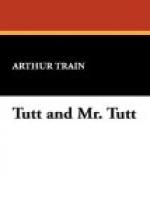Then he rose and called out unexpectedly: “Mr. John De Puyster Hepplewhite—take the stand!”
It was entirely unexpected. No one had suggested that he would be called for the prosecution. Possibly O’Brien was actuated by a slight touch of malice; possibly he wanted to be able, if the case was lost, to accuse Hepplewhite of losing it on his own testimony. But at any rate he certainly had no anticipation of what the ultimate consequence of his act would be.
Mr. Hepplewhite suddenly felt as though his entire intestinal mechanism had been removed. But he had no time to take counsel of his fears. Everybody in the courtroom turned with one accord and looked at him. He rose, feeling as one who dreams; that he is naked in the midst of a multitude. He shrank back hesitating, but hostile hands reached out and pushed him forward. Cringing, he slunk to the witness chair, and for the first time faced the sardonic eyes of the terrible Tutt, his adversary who looked scornfully from Hepplewhite to the jury and then from the jury back to Hepplewhite as if to say: “Look at him! Call you this a man?”
“You are the Mr. Hepplewhite who has been referred to in the testimony as the owner of the house in which the defendant was found?” inquired O’Brien.
“Yes—yes,” answered Mr. Hepplewhite deprecatingly.
“The first witness—Bibby—is in your employ?”
“Yes—yes.”
“Did you have a silver tea set of the value of—er—at least five hundred dollars in the house?”
“It was worth fifteen thousand,” corrected Mr. Hepplewhite.
“Oh! Now, have you been served by the defendant’s attorneys with a summons and complaint in an action for false arrest in which damages are claimed in the sum of one hundred thousand dollars?”
“I object!” shouted Mr. Tutt. “It is wholly irrelevant.”
“I think it shows the importance of the result of this trial to the witness,” argued O’Brien perfunctorily. “It shows this case isn’t any joke—even if some people seem to think it is.”
“Objection sustained,” ruled the court. “The question is irrelevant. The jury is supposed to know that every case is important to those concerned—to the defendant as well as to those who charge him with crime.”
O’Brien bowed.
“That’s all. You may examine, Mr. Tutt.”
The old lawyer slowly unfolded his tall frame and gazed quizzically down upon the shivering Hepplewhite.
“You have been sued by my client for one hundred thousand dollars, haven’t you?” he demanded.
“Object!” shot out O’Brien.
“Overruled,” snapped the court. “It is a proper question for cross-examination. It may show motive.”
Mr. Hepplewhite sat helplessly until the shooting was over.
“Answer the question!” suddenly shouted Mr. Tutt.
“But I thought—” he began.
“Don’t think!” retorted the court sarcastically. “The time to think has gone by. Answer!”




